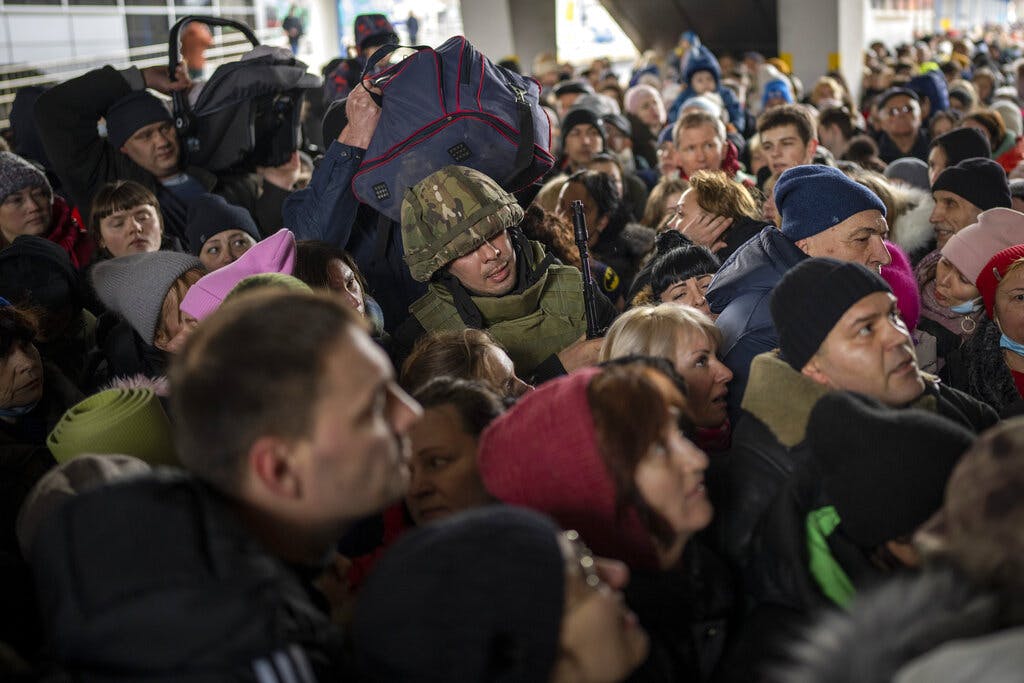Moscow in Damage Control Mode as Its War Machine Grinds On
If calamity by one particular bend of the Dnieper River has been avoided, at least for now, there is certainly not much calm elsewhere.

ATHENS — As the Russian war machine plows through Ukraine and despite mounting casualties on both sides — like the three children who Ukrainian police say were among seven killed in a single Russian rocket attack at the outskirts of Kiev on Friday — one thing is devastatingly clear: Moscow has no intention of hitting the brakes on a campaign now in its second week.
Ongoing military maneuvers include the slog toward Odessa, which the Guardian reports began in earnest today with a Russian assault on the Mykolaiv, a shipbuilding town between Odessa and Kherson — the latter already having succumbed to Russian capture.
Amid justifiable speculation by some Western press outlets that Vladimir Putin underestimated the resolve of Ukrainian resistance and the time it would take to tame it, the Russian military is not only baring its teeth to deadly effect around the vast country, with cities under attack or already under siege, but also raising the stakes of a lethal game over strategy and perception. Nowhere was this clearer today than in the attack at the Zaporizhzhia nuclear power plant and the ensuing media fallout.
That the nuclear power plant, which supplies roughly a fifth of Ukraine’s electricity, is now in Russian hands like the nearby city of Enerhodar and is said to pose no especial danger is only part of the story, as the veracity of the Ukrainian account of a full-on Russian onslaught of a nuclear reactor wilts somewhat when one takes the Russian line into account.
CNN’s Nathan Hodge filed a report on a video briefing given Friday by a Russian defense ministry spokesman, Major General Igor Konashenkov, who said a Russian Guard patrol unit was attacked by what he called “a Ukrainian sabotage group.” He blamed the Ukrainians for setting fire to a building near one of the plant’s six reactors. The optics of Russia inadvertently generating a Fukushima-style nuclear disaster is probably one headache President Putin doesn’t need right now.
An analyst for Britain’s Sky News posited that local Ukrainian commanders were smart to cede the area to the Russians — perhaps recognizing the risks. That didn’t stop Britain’s defense secretary, Ben Wallace, from admonishing Mr. Putin: It is “important he understands” that NATO is a nuclear alliance, he said, the Times of London reports.
If calamity by that particular bend of the Dnieper River has been avoided, at least for now, there is certainly not much calm elsewhere: Explosions continue to be reported in and around Kiev. Air raid sirens have sounded intermittently in various Ukrainian cities including Zhytomyr, Frankivsk, Chernihiv, Odessa, and even Lviv, the city near the Polish border that has become a magnet for Ukrainians trying to get out of Kiev before an anticipated Russian assault on that city.
When and if that onslaught will come is unclear, though a Sky News report late in the day Friday indicated that Russian “battalion tactical groups” are in motion around the city. However, given the present sluggishness of the armed convoy’s approach outside Kiev at the same time cities like Kharkiv and Mariupol come under sustained artillery fire and rocket attack — the full extent of both military and civilian casualties is difficult to assess with accuracy — is it conceivable Moscow wishes to make an example of those other Ukrainian cities to pressure Kiev to surrender without a fight?
In the meantime, Ukraine is doing anything it can to tip the scales in its favor. President Zelensky’s chief of staff, Andriy Yermak, penned a letter in the Times of Israel imploring “Jews across the world to come to our aid.” He writes: “We need more weapons and we need a no-fly zone over Ukraine — immediately. The Ukrainian forces are smashing one Russian convoy snaking its way through Ukraine after another. But the forces are anything but equal. The invaders have the potential to decimate the heart of Ukraine.”
NATO allies have rejected any such no-fly zone because, as Reuters reports today, “stepping in directly would lead to a broader, even more brutal European war so far limited to Russian’s assault on its neighbor.” Material support continues to flow in, though. Greece’s Kathimerini reports that shipment of materials for the accommodation of refugees were dispatched to Slovakia and Moldova from Greece through the European Civil Protection Mechanism Thursday.
A vital member of NATO, Greece is among the numerous European Union nations that have shipped not only humanitarian aid but weapons to Ukraine in recent days. Euronews reports an announcement by the EU’s foreign chief, Josep Borrell, that some countries in the bloc would also be sending fighter jets — though he didn’t specify which, nor how they would be transported across the border into Ukraine. Sweden, according to the same report, will break its neutral stance by sending anti-tank weapons to Kiev.
There is a growing sense in Europe of the urgency of Ukraine’s present plight. Today this reporter observed a Boeing CH-47 Chinook military transport helicopter flying away from Athens — an unusual sight over the skies of the Greek capital. Possibly it was packed with humanitarian aid as it lumbered in a northerly direction out of the city, with the Acropolis in the pilot’s rear view mirror.

